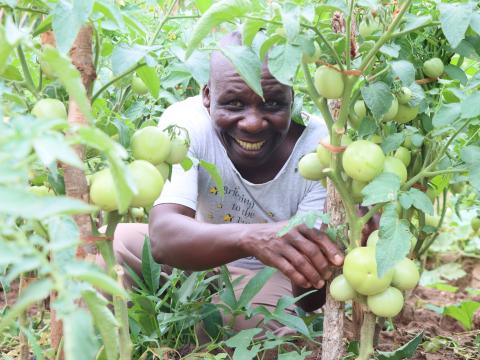Water enables Justin to harvest home grown tomatoes

By Christabel Mundike, Communications Officer, Zambia
Water is central to sustainable development and essential for socioeconomic development, energy and food production, healthy ecosystems, and human survival. Water is also central to climate change adaptation and an important link between society and the environment.
43-year-old Chisela Justin, a farmer of Ngoma village, Kasama District Northern Province, just like other community members, struggled with access to clean water.
“The biggest challenge I faced before the tap was built was that I had to walk a long distance to fetch water from a very contaminated river that caused my family and me to have diarrhoea at the time," says Justin.
Justin and his community waved goodbye to water blues in 2021 when World Vision installed a Mechanised Water system at Ngoma Rural Health Post. Over 20 taps were constructed in households benefiting over 1,030 people.
“But ever since World Vision brought the tap to my doorstep, my family and I have safe, clean drinking water which runs 24/7 and has a lot of pressure," he says. “I can now water my garden and harvest tomatoes for sell, which is helping me buy books, school uniforms and take my children to school”.
“There’s no room to complain; we only thank God for this life-changing development,” Justin says with a smile.
Meanwhile, installing the Mechanised System has led to a booming demand for health care services at the Ngoma Rural Health Post, especially maternal services.
Mulenga James, a nurse charge from the Health Post, has now improved and tripled its numbers for patients seeking medical attention.
“After the mechanized water system was installed, there has been a reduction in the number of scurvy, malaria and diarrheal diseases," he says. "We are now seeing more expectant women seeking maternal services at the facility, a good development because we are reducing home deliveries in Ngoma village."
The availability of clean water in Zambia contributes to transformative change in health, water, sanitation and hygiene (WASH) and livelihoods. Children now have access to safe water for drinking, families are learning to improve sanitation and hygiene practices, and farmers are able to access a sustainable water supply for local agriculture.
World Vision Zambia's 2021-2025 business plan aims to reach 15 million people with access to sustained, clean drinking water close to home, including reaching 4.3 million children with safer drinking water at school and equipping more than 3,000 healthcare facilities with a basic drinking water service.